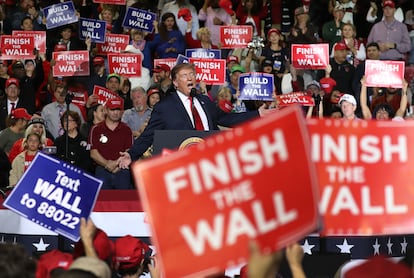Wave of racist messages sent after Trump’s victory raises alarm
The texts inform recipients that they have ‘been selected to pick cotton’ and sparks concern of a potential surge in hate crimes following the Republican’s election

“Greetings. You have been selected to pick cotton at the nearest plantation. Please be ready at 12 a.m., November 13, 2024, SHARP with your belongings. Our Exclusive Slaves will come get you in a brown van, be prepared to be searched upon arrival to plantation. No personal belongings allowed. This is a fresh beginning! You are plantation group C.” That’s the disturbing message that has been sent to Black people following Donald Trump’s victory in last Tuesday’s elections.
Since the morning after the election, there have been nonstop complaints — both official and public — from people who received the messages across various states. The FBI is investigating the matter, though no progress has been made public so far. It remains unclear how many individuals have received such messages or who is behind them. Meanwhile, the messages are fueling concerns that there will be a rise in hate crimes following Trump’s win.
According to reports, children, students at historically Black colleges, and working adults have received these mass texts, which were sent from unidentified numbers across at least 30 states. The messages are strikingly similar, though some include specific details such as the recipient’s name or address. Media outlets have also reported messages targeting Hispanic individuals, warning them to prepare for deportation. However, the majority of messages reference cotton plantations — where millions of Black slaves worked from the 17th century until the Civil War’s end in 1865.
Derrick Johnson, president of the National Association for the Advancement of Colored People (NAACP), issued a statement condemning the texts as a sign of the normalization of racist rhetoric, warning it threatens to disenfranchise African Americans and other minorities. “The unfortunate reality of electing a President who, historically has embraced, and at times encouraged hate, is unfolding before our eyes,” Johnson said. “These messages represent an alarming increase in vile and abhorrent rhetoric from racist groups across the country, who now feel emboldened to spread hate and stoke the flames of fear that many of us are feeling after Tuesday’s election results.”
Since Thursday, the FBI and the Federal Communications Commission (FCC) have launched investigations into the racist text messages. “The FBI is aware of the offensive and racist text messages sent to individuals around the country and is in contact with the Justice Department and other federal authorities on the matter,” reads a brief statement from the agency.
“These messages are unacceptable. That’s why our Enforcement Bureau is already investigating and looking into them alongside federal and state law enforcement,” said FCC Chair Jessica Rosenworcel. “We take this type of targeting very seriously.”
At this time, the sender of the messages remains unknown, and there is no detailed list of recipients. It is believed that the texts were sent through various platforms that enable messages to be sent from randomly generated phone numbers, with only an email address. Several companies that offer these services have confirmed they deactivated accounts as soon as they became aware of the content.
The Nevada Attorney General’s Office described the messages as “robotext messages,” while Louisiana Attorney General Liz Murrill noted that the perpetrators are using software to conceal their identity and location. Prosecutors in other states have also issued statements on the issue.
The wave of messages is a chilling reminder that a trend witnessed during Trump’s first term could be repeated — and perhaps even amplified — in his second. Hate crimes surged nearly 20% from the time Trump took office in 2017 until he left office in 2021, according to FBI statistics. The data also reveals that hate-motivated murders, mostly committed by white supremacists, reached a 28-year high during his administration.
Several independent studies have sought to explain these changes, which reversed a decades-long decline in hate crimes. A hypothesis known as the “Trump Effect” has gained wide acceptance in academic circles studying these crimes. This theory draws a direct link between the rise in hate crimes and the inflammatory rhetoric of Trump’s campaign, especially after his election. The argument is that the election result validated this rhetoric in the eyes of hate crime perpetrators, who felt emboldened by a president they saw as a like-minded ally. The fact that it took mere hours after confirmation of Trump’s victory for a new wave of hate crime messages to surface does not bode well for the years ahead.
Sign up for our weekly newsletter to get more English-language news coverage from EL PAÍS USA Edition
Tu suscripción se está usando en otro dispositivo
¿Quieres añadir otro usuario a tu suscripción?
Si continúas leyendo en este dispositivo, no se podrá leer en el otro.
FlechaTu suscripción se está usando en otro dispositivo y solo puedes acceder a EL PAÍS desde un dispositivo a la vez.
Si quieres compartir tu cuenta, cambia tu suscripción a la modalidad Premium, así podrás añadir otro usuario. Cada uno accederá con su propia cuenta de email, lo que os permitirá personalizar vuestra experiencia en EL PAÍS.
¿Tienes una suscripción de empresa? Accede aquí para contratar más cuentas.
En el caso de no saber quién está usando tu cuenta, te recomendamos cambiar tu contraseña aquí.
Si decides continuar compartiendo tu cuenta, este mensaje se mostrará en tu dispositivo y en el de la otra persona que está usando tu cuenta de forma indefinida, afectando a tu experiencia de lectura. Puedes consultar aquí los términos y condiciones de la suscripción digital.









































